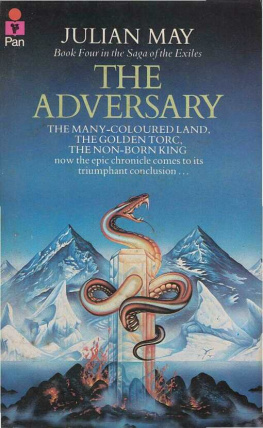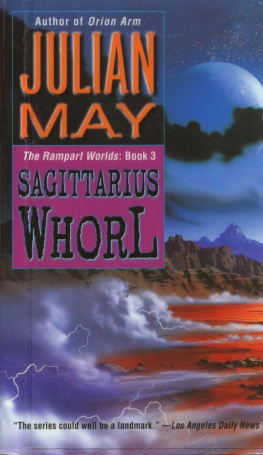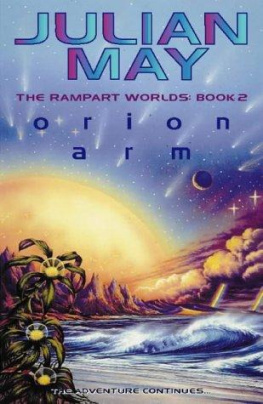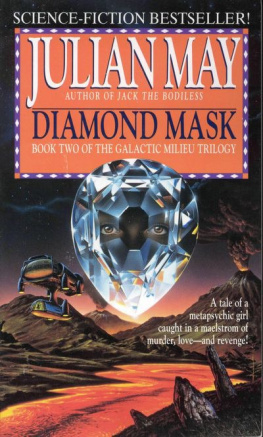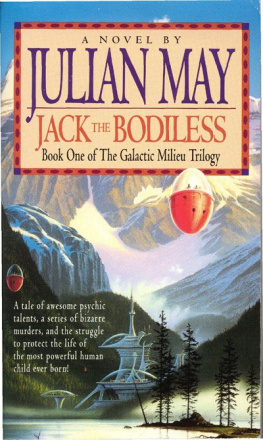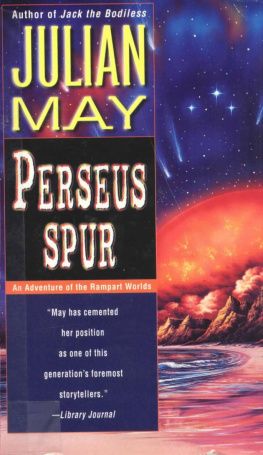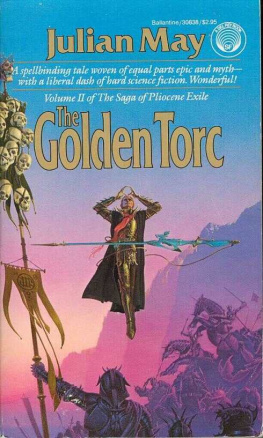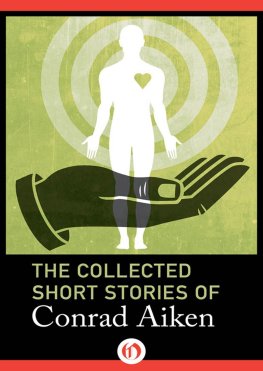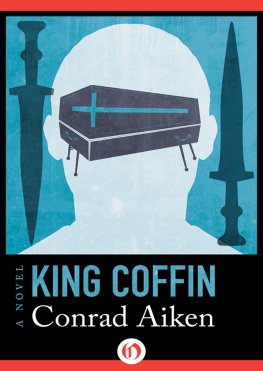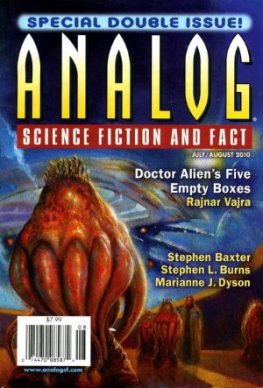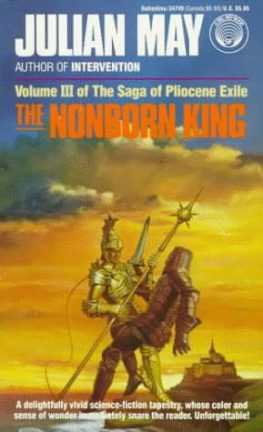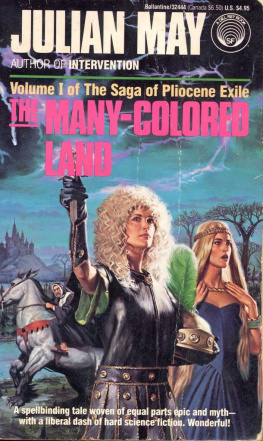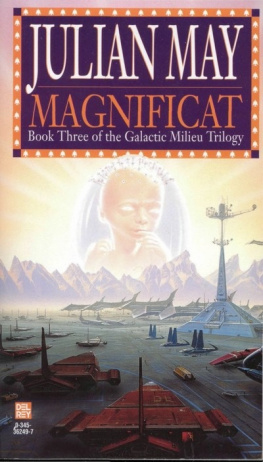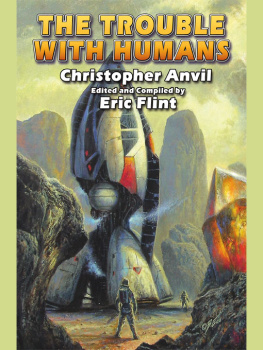The Adversary
Julian May
CONTENTS
The Galactic Milieu And The Pliocene Exile
The Great Intervention of 2013 opened humanity's way to the stars. By the year 2110, when the action of the first volume in this saga began, Earthlings were fully accepted members of a benevolent confederation of planet colonizers, the Coadunate
Galactic Milieu, who shared high technology and the capability of performing advanced mental operations known as metafunctions. Genes for the five principal metapsychic abilities - farsensing, coercion, creativity, psychokinesis, and redaction, or healing-had been part of human heredity from time immemorial; but the mental powers were at first only rarely manifest, remaining mostly latent until evolutionary pressure resulted in increasing numbers of operant human metapsychics, being born late in the twentieth century.
The five founding races of the Galactic Milieu had observed the slow metapsychic development of humanity for tens of thousands of years. But it was not until a small group of beleaguered pioneer operants broadcast a desperate telepathic appeal that the Milieu finally intervened in Earthly affairs. After some debate, the galactic confederation decided to admit Earthlings into the Milieu "in advance of their psychosocial maturation" because of the vast mental potential of humanity, which might eventually exceed that of any other race.
In the hectic years following the Great Intervention, the mundane problems of humanity seemed all but solved. Poverty, disease, and ignorance were wiped out. With the help of the nonhumans, people from Earth colonized more than 700 new planets that had already been surveyed and found suitable.
Earthlings also learned how to speed the development of their metapsychic powers through special training and genetic engineering. However, even though the number of humans with operant metafunctions increased with each generation, in 2110 the majority of the population was still "normal"-that is, possessing metafunctions that were either meagre to the point of nullity or else latent, unusable because of psychological barriers or other factors. Most of the day-to-day socioeconomic activities of the Human Polity of the Milieu were carried on by
"normals," but human metapsychics did occupy privileged positions in government, in the sciences, and in other areas where high mental powers were valuable to the Milieu as a whole.
At only one period between the Great Intervention and 2110 did it seem that the admission of humanity to the Milieu had been a mistake: This was in 2083, during the brief Metapsychic
Rebellion. Instigated by a group of Earth-based humans led by
Marc Remillard, this attempted coup narrowly missed destroying the entire Milieu organization. The Rebellion was suppressed by loyalist humans, who included Marc's own brother, Jack, and steps were taken to insure that such a disaster never would occur again.
A hundred or so battered survivors of the Rebellion managed to evade retribution by following Marc Remillard through a unique escape hatch: a one-way time-gate leading into Earth's
Pliocene Epoch, six million years in the past. Eventually the
Rebels settled on OcalaIsland, in a part of North America that would one day be called Florida. Well equipped with sophisticated Milieu gadgetry, they lived in isolation for twenty-seven years while their leader made a futile search of the Pliocene galaxy with his artificially enhanced farsenses, seeking another planet inhabited by metapsychics with high technology. Marc
Remillard never gave up his dream of human domination of the galaxy-not even when his old allies despaired and their children openly opposed the plan.
In the Galactic Milieu, six million years into the future, the crushing of the Metapsychic Rebellion signalled the start of a new Golden Age for humanity. Human metapsychics achieved
Unity-assimilation into a near-mystical mental fellowship of the Galactic Mind. Nonmetas on the planet Earth and its hundreds of interstellar colonies enjoyed unlimited lebensraum, energy sufficiency, the challenge of settling and exploiting new worlds, and citizenship in a splendid galaxy-wide civilization.
But even Golden Ages have their misfits: in this case, humans who, for one reason or another, were temperamentally unsuited to the rather structured social environment of the Milieu. These malcontents chose to exile themselves by passing through the time-gate that led to an Earth six million years younger.
The time-gate was discovered in 2034, during the heady years of the scientific knowledge explosion subsequent to the Great
Intervention. But since the time-warp opened only backward (anything attempting to return became six million years old and usually crumbled to dust), and since it had a fixed focus (a point in France's RhoneRiverValley), its discoverer concluded that it was a useless oddity without practical application.
After the death of the time-gate discoverer in 2041, his widow,
Madame Angelique Guderian, learned that her husband had been mistaken. The fair numbers of malcontents in the developing Human Polity of the Milieu were willing to pay handsomely to be transported to a simpler world without rules. Geologists and paleontologists knew that the Pliocene Epoch was an idyllic period just before the dawn of rational life on our planet.
Romantics and rugged individualists from almost all of Earth's ethnic groups eventually discovered Madame's "underground railroad" to the Pliocene, which operated out of a quaint French inn located outside the metropolitan centre of Lyon.
From 2041 until 2106, the rejuvenated Madame Guderian transported clients from the Milieu to the Pliocene Exile, a presumed natural paradise. After suffering belated qualms of conscience about the fate of the time-travellers, Madame herself passed into the Pliocene, and operation of her clandestine service was taken over by the Human Polity in a quasi-official manner: The time-gate was a convenient glory hole for dissidents.
By 2110, when the gate into the Pliocene Exile had been operating for nearly seventy years, some 100,000 human timefarers had passed through it into an unknown destiny.
On 25 August 2110, eight persons, making up that week's
"Group Green," were transported to Exile. These three women and five men would play key roles in a drama that would affect not only the Pliocene world, but ultimately that of the Milieu itself.
Group Green discovered, as other time-travellers had before them, that the natural paradise of Pliocene Europe was under the control of a humanoid race from the Duat Galaxy, a starwhirl many millions of light years away from our own part of the universe. The exotics were also exiled, having been driven from their home because of their barbarous battle-religion.
The dominant exotic faction, the Tanu, were tall and handsome. In spite of a thousand-year sojourn on Earth, there were still less than 20,000 of them because their reproduction was inhibited by solar radiation. Antagonistic to the Tanu and outnumbering them by at least four to one were their ancient foes, the Firvulag. Often called the Little People, these exotics were mostly of short stature, although there were plenty of human-sized and even gigantic individuals among them. They reproduced quite well on Earth but were short-lived compared to the Tanu.
Tanu and Firvulag constituted a dimorphic race-the former metapsychically latent, and the latter possessed of operant metafunctions, mostly limited in power. The Tanu, with their higher technology, had long ago developed mind-amplifying devices, called golden torcs, that raised them to operancy. Use of the torcs had its price, however: A certain percentage of
Tanu children proved incompatible with it and died of the
Next page
